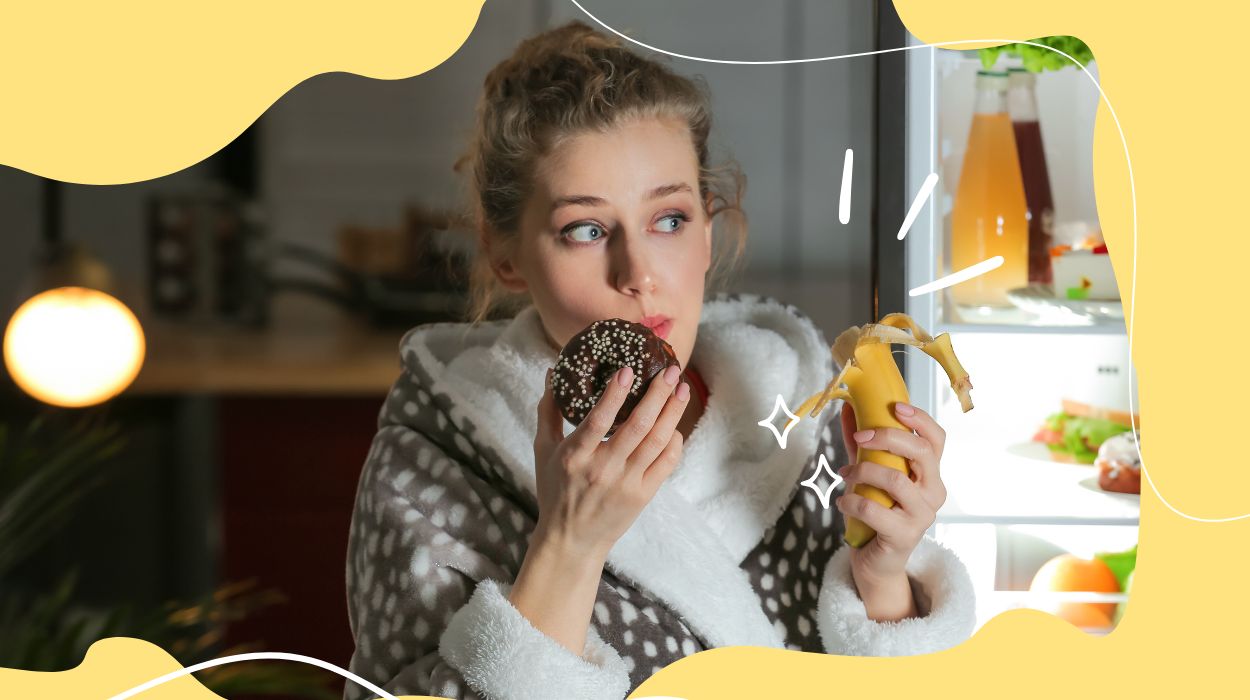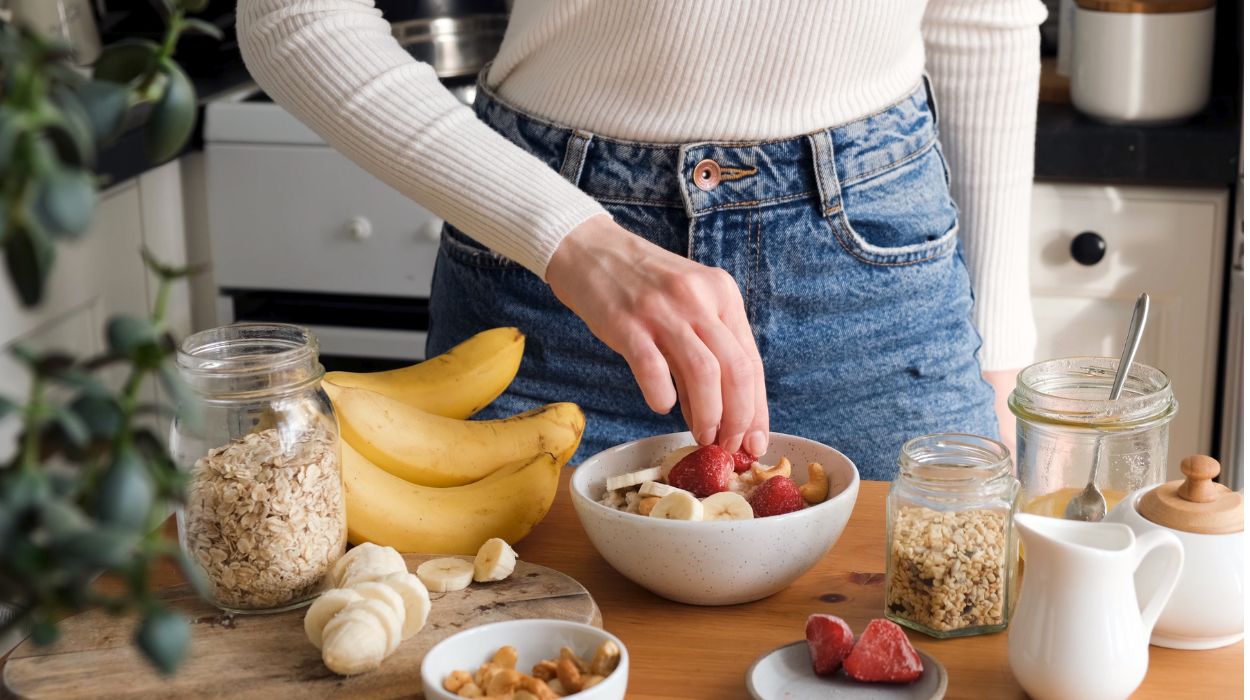 Expert's opinion
Expert's opinion
Expert's opinion
The article is a subjective view on this topic written by writers specializing in medical writing.
It may reflect on a personal journey surrounding struggles with an illness or medical condition, involve product comparisons, diet considerations, or other health-related opinions.
Although the view is entirely that of the writer, it is based on academic experiences and scientific research they have conducted; it is fact-checked by a team of degreed medical experts, and validated by sources attached to the article.
The numbers in parenthesis (1,2,3) will take you to clickable links to related scientific papers.
10 Healthy Snacks For Weight Loss At Night 2024 – What Can I Eat?

Enjoying a snack late at night may be a standard, socially acceptable practice, but it runs the risk of packing on unwanted pounds. You can satisfy snack cravings and use a fat burner to stay lean. However, healthy snacks can put cravings to bed without sacrificing flavor, texture, or emotional satisfaction. Learn more about healthy snacks for weight loss at night that not only lose weight but also taste amazing.
What Can I Eat Late At Night To Lose Weight?
Instead of rummaging through the refrigerator or kitchen pantry for snacks laden with fat, sugar, or highly processed, check out some healthy alternatives. The following late-night snacks are great for losing weight without leaving you feeling hungry.
10 Best Late-Night Snacks For Weight Loss
If you want to maintain a healthy weight, avoid foods that contribute to belly fat and consider snacking on the following healthy snacks instead.
Greek Yogurt
Grab some Greek yogurt[1] for a nutrient-dense and filling snack full of probiotics[2] to support a healthy gut microbiome. Eating Greek yogurt may help with weight loss because it contains significant protein and is low in fat. Foods that support a healthy microbiome[3] also keep weight gain in check, support the immune system, and promote better digestion.
Recipe to Try: Have some plain yogurt by itself or pair it with some fresh berries to satisfy a sweet tooth, fresh veggies, or a small amount of granola.
Hummus
Hummus is a perfect late-night nutrient-dense snack because it provides protein, fiber, healthy fat, iron, vitamins A, C, E, and folate. Studies[4] have shown that people who eat hummus regularly are less likely to be overweight. Eating foods rich in protein and fiber may encourage weight loss.
Recipe To Try: Break out the pita chips or whole-grain crackers to dip into hummus, fresh veggies like celery sticks, raw carrots, or even pretzels.
Popcorn
Provided that you don’t drown popcorn in butter and fatty cheese, it is an excellent snack to grab late at night. Opt for air-popped instead of snacking on microwave popcorn and be light on the seasoning. Popcorn[5] is a good source of fiber, has antioxidants, and improves bone health.
Recipe To Try: Watch your portion sizes but enjoy cooking popcorn on the stovetop using olive or avocado oil. Add a minimum of salt or parmesan cheese to taste for flavor and keep the snack low in fat.
Bananas
The next time the urge to snack late at night arrives, reach for a banana or two for a sweet treat that satisfies cravings. Bananas are an excellent source of filling fiber[6], vitamins B6 and B9, potassium and are low in calories.
Recipe To Try:
- Slather some peanut butter on a banana.
- Eat by itself.
- Make a banana smoothie using frozen bananas and a bit of Greek yogurt.
Peanut Butter on Whole Grain Bread
Peanut butter may be high in fat and calories, but practice portion control when spooning it out on two pieces of whole wheat bread for a satisfying snack. Peanut butter is full of healthy unsaturated fats and plenty of protein to keep you full. Furthermore, it helps with type 2 diabetes symptoms[7], and the addition of whole-grain bread packs on the fiber[8] for better blood sugar[9] levels. If peanut butter is a problem for you, try almond butter as an alternative.
Recipe To Try:
- Stick to whole-grain bread and avoid highly processed or refined white bread.
- Stay within the suggested serving size of peanut butter to keep this snack weight-loss friendly.
- If you wish, toss in some banana slices to keep things interesting and flavorful.
Berries
Reach for a handful of fresh fruit like berries[10] the next time you feel hungry late at night. Raid the refrigerator for strawberries, blueberries, blackberries, raspberries, or tart cherries to end hunger pangs. Practice portion control and enjoy the satisfaction of consuming natural sugar without having to add ice cream, whip cream, sugar, or chocolate to improve your late-night snack.
Recipe To Try: Eat a handful or two of berries alone or pair it with a small bowl of oatmeal, a single serving of Greek yogurt, or make a low-fat smoothie to enjoy.
Nuts
Even though nuts may get a bad reputation for being high in fats, they stave off hunger because they provide plenty of filling fiber and protein. Focus on snacking on nuts like peanuts, cashews, almonds, walnuts, or pistachios for their flavor and health benefits. Many nuts are full of antioxidants[11], healthy fats and help you manage weight[12].
Recipe To Try: Enjoy nuts by themselves or add to Greek yogurt or after being lightly toasted in the oven but skip out on salting them.
Oatmeal
Classic breakfast ideas like oatmeal aren’t only for starting your morning. Enjoy a reasonable portion of oatmeal to satisfy the urge to snack late at night and improve blood pressure[13] and weight loss. Oatmeal keeps you feeling full longer because it contains soluble fiber if you can opt for steel-cut oats or rolled oats.

Recipe To Try: Avoid the desire to dump added sugar into your oatmeal. Do keep your healthy snack tasty with the addition of nuts, a bit of honey, or mixed berries.
Turkey Sandwich
A lean animal protein like turkey can prove to be a healthy snack worthy of diving into late at night.
Because turkey is rich in protein, it may keep you feeling fuller longer and support healthy weight loss. Also, since turkey contains the amino acid tryptophan[14], it may help promote sleep after snacking.
Recipe To Try: Cut down on gaining unwanted weight and belly fat and replace mayo with mustard or even a layer of hummus. Stick to whole-grain bread, and feel free to add a slice of tomato, some lettuce, or onions for color and flavor.
Eggs
Keep your snacking at night simple, and grab an egg or two to keep you full and happy. Eggs are a low-calorie food rich in protein, vitamins, minerals, and good any time of the day. Eating eggs helps boost good cholesterol levels[15] and may help reduce belly fat and boost metabolism levels.
Recipe To Try: Try to stick to enjoying hard-boiled eggs rather than frying or scrambling them in oils or butter. Pair an egg with a slice or two of whole-grain toast or enjoy alone.
What Triggers Late-Night Snacking?
So, why is it that some people feel compelled to engage in late-night snacking? Workers who have a late shift may eat shortly after clocking out, contributing to poor sleep quality and digestive problems. Some people suffer from eating disorders when eating at odd times, often late in the night. Others snack at night because of boredom or hunger.
Keeping late-night snacking under control is critical to preventing unwanted teeth damage, weight gain, and digestive problems. However, if you can’t help yourself when the desire to snack is strong, choose healthy foods that don’t readily contribute to weight gain. Keep in mind, the body’s metabolism levels drop sharply late at night, around bedtime.
Why Is It Bad To Eat Late-Night Snacks?
If you want to lose belly fat, be careful about eating late at night too often. There are more than a few reasons it is harmful to eat late-night snacks. Eating late at night can contribute to the following problems.
- Unwanted weight gain
- Poor quality sleep
- Gastric distress and poor digestion
- Skyrocketing blood sugar levels
- Increased risk for metabolic syndrome

Overall, eating late at night is a bad idea because it can throw off your body’s circadian rhythm. Late-night snacking may also increase the chance of experiencing depression, anxiety, or developing hypertension or diabetes. Many late-night snackers may also find it challenging to focus on tasks the following day or feel sluggish.
Too often, it is assumed that one lacks willpower when gorging on unhealthy food choices late at night. When you crave foods late at night, your body may be craving a hit of feel-good serotonin[16]. Serotonin rises with late-night snacking.
Because metabolism levels are typically lower at night, eating late can have a high cost; weight gain and an expanded belly.
When possible, try to eat earlier in the day and fill up on protein and fiber-rich foods that leave you feeling fuller longer. Relying on a diet filled with simple carbohydrates, high-fat, and high-salt foods can leave you feeling hungry later, perpetuating cravings to snack later in the day or at night. Also, sometimes what feels like hunger pangs is the body craving water because of dehydration.
Before scarfing down a tub of ice cream or reaching for fatty convenience foods, try drinking a glass of water first. You may be able to curb cravings to snack simply by hydrating your body before going for food.
What Does Eating Late Do To Your Body?
It is bad enough to indulge in snacking on foods high in sugar or fat, which often leave you unsatisfied and feeling hungry late at night. Snack foods often quickly raise insulin levels but lack substantial protein, fiber, or elements that sate hunger and only promote cravings. Also, some people do suffer from eating disorders like night eating syndrome, which leads to snacking.
However, one must ask, how does eating late affect the body? Surprisingly, there are a host of results that can take place because of late-night eating.
Unfortunately, in most cases, snacking late falls outside of the typical cycle of sleeping and waking. So, any food eaten late in the night will be more likely stored as fat rather than burned off. The digestive system often has trouble breaking down late-night meals, leading to common problems like heartburn and indigestion.
Eating late can also increase the risk of becoming obese, perpetuate emotional eating, or create eating disorders. GERD risk and sleeping disorders[17] increase from eating late, mainly if you lie down on your stomach while eating or shortly after consuming your snacks.
You increase the chance of becoming ill when you eat late at night. The body will be more focused on digesting food and hurriedly distributing nutrients rather than maintaining your health and a healthy microbiome.
It is also harder to get a good night’s sleep if you find yourself frequently waking up to snack late at night or because your tummy keeps you from getting better sleep. Poor sleep quality or not getting enough sleep can lead to weight gain, irritability, and other health problems.
How To Avoid Late-Night Snacking?
If you can avoid snacking late at night, by all means, do so. Even if you reach for healthier foods for yourself and reduce the chance of creating belly fat or increasing metabolic activity, eating late can be disastrous for your health. Eating late can make it difficult to fall asleep and make you gain weight.
Make an effort to eat earlier in the day, and have breakfast be the most essential and calorie-laden meal. Eat a bit less at lunchtime, and eat the least at dinner. Snack smart and avoid foods that are high in fat, salt, overly processed, or cause you to feel incredibly hungry later.
Avoid running to food to satisfy emotional eating and learn healthy coping skills to deal with life’s ups and downs. If you live with an eating disorder that pushes you to eat late at night, seek counseling from a certified healthcare professional.
Drink enough water, regularly practice physical exercises, and get enough restful sleep to keep your body in balance. Stress, a poor diet, not drinking enough water, working specific shifts and a sedentary lifestyle can encourage snacking.
Conclusion
If you are concerned about burning fat and maintaining a healthy weight, choose foods that support weight loss and reduce belly fat. Often, the snacks we choose at night can be poor for our health and waistline. However, choosing healthy, weight-friendly snack foods is your best bet when a late-night craving strikes.
+ 17 sources
Health Canal avoids using tertiary references. We have strict sourcing guidelines and rely on peer-reviewed studies, academic researches from medical associations and institutions. To ensure the accuracy of articles in Health Canal, you can read more about the editorial process here
- Chandan, R.C., Gandhi, A. and Shah, N.P. (2017). Yogurt. [online] pp.3–29. doi:https://doi.org/10.1016/b978-0-12-805134-4.00001-8.
- Park, S. and Bae, J. (2015). Probiotics for weight loss: a systematic review and meta-analysis. [online] 35(7), pp.566–575. doi:https://doi.org/10.1016/j.nutres.2015.05.008.
- Arora, T. and Raj Kumar Sharma (2011). Fermentation potential of the gut microbiome: implications for energy homeostasis and weight management. [online] 69(2), pp.99–106. doi:https://doi.org/10.1111/j.1753-4887.2010.00365.x.
- Reister, E.J., Belote, L.N. and Leidy, H.J. (2020). The Benefits of Including Hummus and Hummus Ingredients into the American Diet to Promote Diet Quality and Health: A Comprehensive Review. [online] 12(12), pp.3678–3678. doi:https://doi.org/10.3390/nu12123678.
- Nguyen, V., Cooper, L.A., Lowndes, J., Melanson, K.J., Angelopoulos, T.J., Rippe, J.M. and Reimers, K. (2012). Popcorn is more satiating than potato chips in normal-weight adults. [online] 11(1). doi:https://doi.org/10.1186/1475-2891-11-71.
- Apostolopoulos, V., Antonipillai, J., Tangalakis, K., Ashton, J.R. and Stojanovska, L. (2017). Let’s Go Bananas! Green Bananas and their Health Benefits. [online] 38(2), pp.147–151. doi:https://doi.org/10.1515/prilozi-2017-0033.
- Jiang, R., Manson, J.E., Stampfer, M.J., Liu, S., Willett, W.C. and Hu, F.B. (2002). Nut and Peanut Butter Consumption and Risk of Type 2 Diabetes in Women. [online] 288(20), pp.2554–2554. doi:https://doi.org/10.1001/jama.288.20.2554.
- Collar, C. (2008). Novel high-fibre and whole grain breads. [online] pp.184–214. doi:https://doi.org/10.1533/9781845693886.2.184.
- Jukka Montonen, Boeing, H., Fritsche, A., Schleicher, E., Joost, H.-G., Schulze, M.B., Steffen, A. and Pischon, T. (2012). Consumption of red meat and whole-grain bread in relation to biomarkers of obesity, inflammation, glucose metabolism and oxidative stress. [online] 52(1), pp.337–345. doi:https://doi.org/10.1007/s00394-012-0340-6.
- James, L.J., Funnell, M.P. and Milner, S. (2015). An afternoon snack of berries reduces subsequent energy intake compared to an isoenergetic confectionary snack. [online] 95, pp.132–137. doi:https://doi.org/10.1016/j.appet.2015.07.005.
- Rune Blomhoff, Monica Hauger Carlsen, Lene Frost Andersen and Jacobs, D.R. (2006). Health benefits of nuts: potential role of antioxidants. [online] 96(S2), pp.S52–S60. doi:https://doi.org/10.1017/bjn20061864.
- Steele, M.L., Truong, J., Suresh Govindaraghavan, Ooi, L., Sucher, N.J. and Münch, G. (2013). Cytoprotective properties of traditional Chinese medicinal herbal extracts in hydrogen peroxide challenged human U373 astroglia cells. [online] 62(5), pp.522–529. doi:https://doi.org/10.1016/j.neuint.2012.08.018.
- Fontana, L., Sai Krupa Das, Lichtenstein, A.H., Dallal, G.E., Corrales, A., Schaefer, E.J., Greenberg, A.S. and Roberts, S.B. (2001). An Oat-Containing Hypocaloric Diet Reduces Systolic Blood Pressure and Improves Lipid Profile beyond Effects of Weight Loss in Men and Women. [online] 131(5), pp.1465–1470. doi:https://doi.org/10.1093/jn/131.5.1465.
- Lieberman, H.R., Agarwal, S. and Fulgoni, V.L. (2016). Tryptophan Intake in the US Adult Population Is Not Related to Liver or Kidney Function but Is Associated with Depression and Sleep Outcomes. [online] 146(12), pp.2609S2615S. doi:https://doi.org/10.3945/jn.115.226969.
- Griffin, B.A. (2016). Eggs: good or bad? [online] 75(3), pp.259–264. doi:https://doi.org/10.1017/s0029665116000215.
- Wurtman, R.J. and Wurtman, J.J. (1995). Brain Serotonin, Carbohydrate-Craving, Obesity and Depression. [online] 3(S4), pp.477S480S. doi:https://doi.org/10.1002/j.1550-8528.1995.tb00215.x.
- Fujiwara, Y., Arakawa, T. and Fass, R. (2012). Gastroesophageal reflux disease and sleep disturbances. [online] 47(7), pp.760–769. doi:https://doi.org/10.1007/s00535-012-0601-4.



